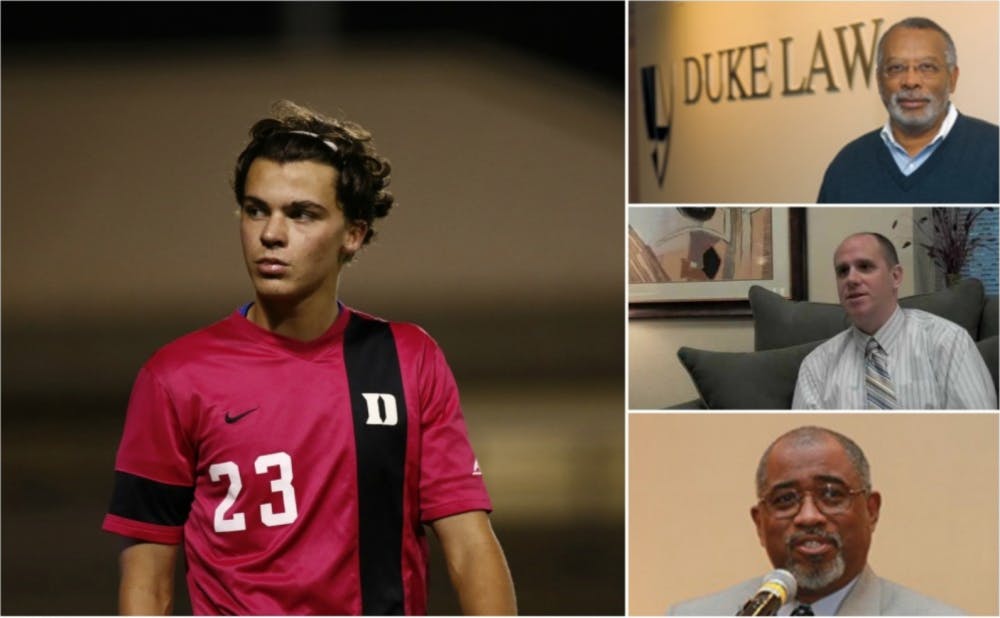Duke senior men's soccer player Ciaran McKenna resolved a lawsuit against the University after more than a year of legal battles, according to a report by the News and Observer.
McKenna had previously won a permanent injunction in February 2018 against a suspension the University attempted to levy on him. Emilia Beskind, one of his attorneys, told The News & Observer that McKenna is currently a student in good standing with no disciplinary record and plans to graduate this December.
Michael Schoenfeld, vice president for public affairs and government relations at Duke, declined to comment on the resolution of the breach-of-contract lawsuit in an email to The Chronicle.
The misconduct accusation stems from an incident that allegedly occurred Nov. 14, 2015, when McKenna—then a first-year—and a female student met at Shooters II Saloon and had a sexual encounter later that night. Months later, the female student filed a complaint with the Office of Student Conduct alleging that she had not given consent.
Although a three-member OSC panel that convened in July 2016 was unsure whether the female student verbally denied consent, it unanimously concurred that McKenna's testimony failed "to show that the complainant clearly and affirmatively consented to having sexual intercourse." As punishment, the panel decided on a six-semester suspension.
McKenna appealed this verdict, citing questionable testimony by the female student. The alleged victim said she was a virgin at the time of the incident, but McKenna claimed that she had a previous sexual relationship with another member of the soccer team.
He also questioned the panel's application of the "reasonable person standard" outlined in the sexual misconduct policy.
"The perspective of a reasonable person will be the basis for determining whether a respondent knew, or reasonably should have known, whether consent was given,” the policy states.
In September 2016, a four-person appeals board found "procedural errors" with the first panel and directed OSC to rectify the problem.
Despite his objections, McKenna was informed that his case would now go before a second panel. James Coleman Jr., John S. Bradway professor of the practice of law and faculty adviser to McKenna, sent an email to several Duke administrators objecting to the creation of another panel. He argued that this would constitute an instance of double jeopardy.
At a later trial, Dean of Students Sue Wasiolek mentioned that the departure of one original panel member necessitated the creation of another panel. The Chronicle previously reported that Jerrica Washington, a student involvement program coordinator who served on the first panel, was no longer listed on the Duke Directory in February 2017.
The second panel also decided on a six-semester suspension in November 2016. McKenna subsequently appealed this decision to the same appeals board but was notified in January 2017 that no procedural errors were present in the second panel's reasoning.
He then filed for a preliminary injunction, which was granted by Superior Court Judge Orlando Hudson in February 2017. This permitted McKenna to remain at the University during pending litigation. In February 2018, Hudson permanently barred the University from suspending McKenna for the sexual misconduct claims.
The exact terms of the lawsuit's recent settlement have not been released.
Earlier this year, the University settled a long-running lawsuit related to its sexual misconduct process with Lewis McLeod, who came to Duke in 2014 and was a men's soccer player. McLeod was granted his degree in the outcome of the lawsuit, although most terms of the settlement were similarly undisclosed. In a closing argument in February, McKenna's lawyer cited McLeod's case as support for his position.
Get The Chronicle straight to your inbox
Signup for our weekly newsletter. Cancel at any time.

